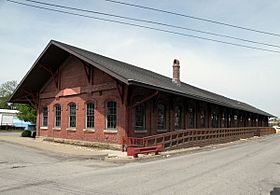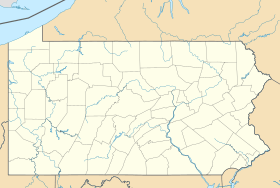Pennsylvania Railroad Freight Station (Washington, Pennsylvania) facts for kids
Quick facts for kids |
|
|
Pennsylvania Railroad Freight Station
|
|

Pennsylvania Railroad Freight Station in 2010
|
|
| Location | 111 Washington Street, Washington, Pennsylvania |
|---|---|
| Area | 2.25 acres (0.91 ha) |
| Built | 1871 |
| Architectural style | Late Victorian |
| NRHP reference No. | 95000891 |
| Added to NRHP | July 21, 1995 |
The Pennsylvania Railroad Freight Station is a historic building in Washington, Pennsylvania. It was once a busy place where trains loaded and unloaded goods. This building is also known as the Chartiers Valley Railway Freight Station.
It is a very important landmark. On July 21, 1995, it was added to the National Register of Historic Places. This list includes buildings, sites, and objects that are important in American history. The Washington County History & Landmarks Foundation also calls it a historic public landmark.
History of the Freight Station
This station was built in 1871 for the Chartiers Valley Railroad. A freight station is a special building where trains bring or pick up items like food, clothes, or building materials. It's like a big warehouse for train cargo.
Later in 1871, another company, the Pittsburgh, Cincinnati and St. Louis Railroad (PC&StL), leased the station. This means they paid to use it.
Changes in Ownership
Over the years, different railroad companies owned or managed the station. In 1907, the Chartiers Valley Railroad joined with the Pittsburgh, Cincinnati, Chicago and St. Louis Railroad (PCC&StL).
Then, in 1921, the famous Pennsylvania Railroad leased the PCC&StL. This made the station part of a much larger railroad network.
The Station's Final Years as a Railroad Building
Eventually, the Pennsylvania Railroad joined with the New York Central Railroad. They formed a new company called Penn Central.
But Penn Central faced big money problems. In 1970, the company went bankrupt, meaning it ran out of money. Because of this, the station was sold to a private person. It did not become part of Conrail, which took over many of Penn Central's other properties in 1976.
Today, the building stands as a reminder of the important role railroads played in moving goods across the country.
 | Valerie Thomas |
 | Frederick McKinley Jones |
 | George Edward Alcorn Jr. |
 | Thomas Mensah |


